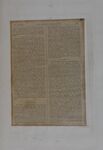HPB-SB-10-119: Difference between revisions
No edit summary |
mNo edit summary |
||
| Line 7: | Line 7: | ||
{{Style P-HPB SB. Title continued |The Progress of Psychology|10-118}} | {{Style P-HPB SB. Title continued |The Progress of Psychology|10-118}} | ||
But, if everywhere, in what condition of existence? What, in fact, should we see if our eyes were suddenly endowed with a power of vision competent to receive and convey to the mind the impressions of non-molecular being, as now they are of molecular being? | |||
<center>THE WORLD OF SPIRITS.</center> | |||
Without stirring a step, without the addition of an inch to the range of vision, within the circle which a minute before was a void about which was scattered a few visible things, we should witness a new world, thronged with inhabitants. The embodied souls of men would be seen more plainly than their bodies were seen before by the natural eye. The soul would appear as the substance of the man, and the molecular body as a mere clothing of the soul, that is in fact the man. We should see that soul (or spirit) often exercising influences upon other substances outside the body, and often enabled to hold direct communication with the souls having other bodies without the intervention of the senses. We should doubtless see forms like our own, but which, being of non-molecular structure, we could not see with our molecular vision. The world thus revealed would possibly be a reflex of that we call our world. All space might well be peopled with some forms of being—“but while this muddy vesture of decay doth grossly hem us in we cannot see it.” | |||
This is but one of the vast regions that present themselves to the psychologist for exploration. I ask you, then, to give your hearty co-operation in the great work that lies before us. It is not dull work, nor tedious work, for every step opens to you new wonders. It is not “harsh and rugged, as dull fools suppose, but musical as is Apollo’s lute.” It teems with questions the most interesting—the most elevating—that could engage the intelligence. We believe that by instituting the ''viva, voce ''examinations of witnesses, we have given a new and vastly increased impetus to the progress of psychological science, enlisting, as it does, the ears and thoughts of those who could not give the needful attention to mere disquisition. You can best promote this great work by your presence at these amusing and instructive investigations, submitting doubts, asking particulars, and suggesting explanations. That is the present duty of this society, and to that we earnestly invite you, believing that it has opened the true pathway to the certain triumphs that await our science in the future. | |||
{{HPB-SB-item | {{HPB-SB-item | ||
Revision as of 07:50, 16 August 2024
< The Progress of Psychology (continued from page 10-118) >
But, if everywhere, in what condition of existence? What, in fact, should we see if our eyes were suddenly endowed with a power of vision competent to receive and convey to the mind the impressions of non-molecular being, as now they are of molecular being?
Without stirring a step, without the addition of an inch to the range of vision, within the circle which a minute before was a void about which was scattered a few visible things, we should witness a new world, thronged with inhabitants. The embodied souls of men would be seen more plainly than their bodies were seen before by the natural eye. The soul would appear as the substance of the man, and the molecular body as a mere clothing of the soul, that is in fact the man. We should see that soul (or spirit) often exercising influences upon other substances outside the body, and often enabled to hold direct communication with the souls having other bodies without the intervention of the senses. We should doubtless see forms like our own, but which, being of non-molecular structure, we could not see with our molecular vision. The world thus revealed would possibly be a reflex of that we call our world. All space might well be peopled with some forms of being—“but while this muddy vesture of decay doth grossly hem us in we cannot see it.”
This is but one of the vast regions that present themselves to the psychologist for exploration. I ask you, then, to give your hearty co-operation in the great work that lies before us. It is not dull work, nor tedious work, for every step opens to you new wonders. It is not “harsh and rugged, as dull fools suppose, but musical as is Apollo’s lute.” It teems with questions the most interesting—the most elevating—that could engage the intelligence. We believe that by instituting the viva, voce examinations of witnesses, we have given a new and vastly increased impetus to the progress of psychological science, enlisting, as it does, the ears and thoughts of those who could not give the needful attention to mere disquisition. You can best promote this great work by your presence at these amusing and instructive investigations, submitting doubts, asking particulars, and suggesting explanations. That is the present duty of this society, and to that we earnestly invite you, believing that it has opened the true pathway to the certain triumphs that await our science in the future.
A Death Trance
...
Captain Burton's Travels Eclipsed
...
Editor's notes

